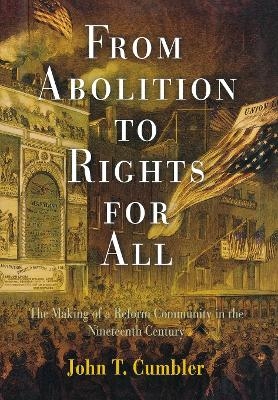
From Abolition to Rights for All
The Making of a Reform Community in the Nineteenth Century
Seiten
2007
University of Pennsylvania Press (Verlag)
978-0-8122-4026-9 (ISBN)
University of Pennsylvania Press (Verlag)
978-0-8122-4026-9 (ISBN)
- Lieferbar (Termin unbekannt)
- Versandkostenfrei innerhalb Deutschlands
- Auch auf Rechnung
- Verfügbarkeit in der Filiale vor Ort prüfen
- Artikel merken
The Civil War was not the end, as is often thought, of reformist activism among abolitionists. This book investigates how reformers, linked together and radicalized by their shared experiences in the abolitionist struggle, articulated a core natural rights ideology and molded it into a rationale for successive reform movements.
The Civil War was not the end, as is often thought, of reformist activism among abolitionists. After emancipation was achieved, they broadened their struggle to pursue equal rights for women, state medicine, workers' rights, fair wages, immigrants' rights, care of the poor, and a right to decent housing and a healthy environment. Focusing on the work of a key group of activists from 1835 to the dawn of the twentieth century, From Abolition to Rights for All investigates how reformers, linked together and radicalized by their shared experiences in the abolitionist struggle, articulated a core natural rights ideology and molded it into a rationale for successive reform movements.
The book follows the abolitionists' struggles and successes in organizing a social movement. For a time after the Civil War these reformers occupied major positions of power, only to be rebuffed in the later years of the nineteenth century as the larger society rejected their inclusive understanding of natural rights. The narrative of perseverance among this small group would be a continuing source of inspiration for reform. The pattern they established—local organization, expansive vision, and eventual challenge by powerful business interests and individuals—would be mirrored shortly thereafter by Progressives.
The Civil War was not the end, as is often thought, of reformist activism among abolitionists. After emancipation was achieved, they broadened their struggle to pursue equal rights for women, state medicine, workers' rights, fair wages, immigrants' rights, care of the poor, and a right to decent housing and a healthy environment. Focusing on the work of a key group of activists from 1835 to the dawn of the twentieth century, From Abolition to Rights for All investigates how reformers, linked together and radicalized by their shared experiences in the abolitionist struggle, articulated a core natural rights ideology and molded it into a rationale for successive reform movements.
The book follows the abolitionists' struggles and successes in organizing a social movement. For a time after the Civil War these reformers occupied major positions of power, only to be rebuffed in the later years of the nineteenth century as the larger society rejected their inclusive understanding of natural rights. The narrative of perseverance among this small group would be a continuing source of inspiration for reform. The pattern they established—local organization, expansive vision, and eventual challenge by powerful business interests and individuals—would be mirrored shortly thereafter by Progressives.
John T. Cumbler is Professor of History at the University of Louisville and is the author of several books, including Reasonable Use: The People, the Environment, and the State, New England 1790-1930.
| Erscheint lt. Verlag | 26.10.2007 |
|---|---|
| Verlagsort | Pennsylvania |
| Sprache | englisch |
| Maße | 152 x 229 mm |
| Themenwelt | Geisteswissenschaften ► Geschichte ► Regional- / Ländergeschichte |
| Sozialwissenschaften ► Politik / Verwaltung | |
| ISBN-10 | 0-8122-4026-X / 081224026X |
| ISBN-13 | 978-0-8122-4026-9 / 9780812240269 |
| Zustand | Neuware |
| Haben Sie eine Frage zum Produkt? |
Mehr entdecken
aus dem Bereich
aus dem Bereich
Erinnerungen
Buch | Softcover (2024)
Pantheon (Verlag)
16,00 €


